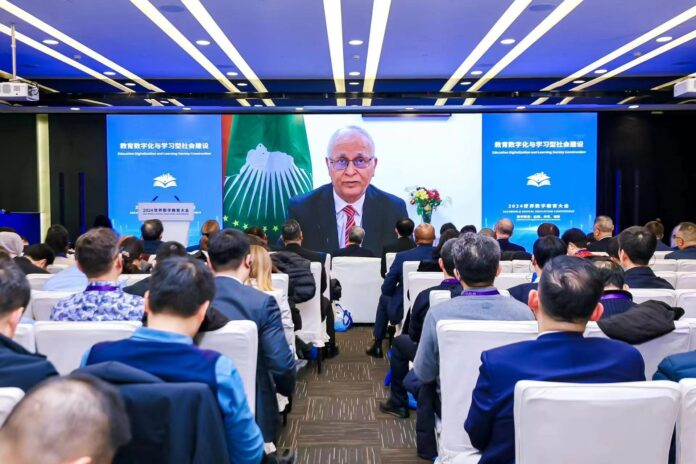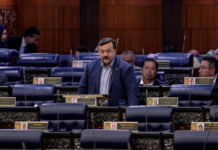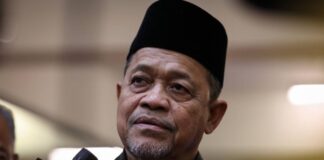Chinese and foreign participants discuss in the parallel session on “ Education Digitalization and Learning Society Construction ” at the 2024 World Digital Education Conference.
On January 30, the parallel session on “ Education Digitalization and Learning Society Construction ” was held in Shanghai as part of the 2024 World Digital Education Conference. More than 240 representatives from educational departments, universities, and research institutions from 35 countries and regions participated in the conference. Focusing on the theme of “Digital Education: Application, Sharing, and Innovation,” the conference delved into the theoretical and practical issues of building a learning society in the digital age from different perspectives.
Wu Yan, Deputy Minister of China’s Ministry of Education, pointed out that the construction of a learning society is an important issue of international concern. With the improvement of the level of higher education popularization, especially the rapid development of information technology, the vision of “learning anytime, anywhere, and by everyone” has become a reality. In recent years, the Chinese Ministry of Education has implemented a strategy for digital education and established a national smart education platform, creating a digital foundation for a learning society. China has been continuously promoting the construction of learning cities, learning communities, and learning enterprises, encouraging everyone to have a passion for learning. With the world’s largest scale of digital education, China is serving the world’s largest learning population. China is willing to strengthen cooperation with relevant countries and international organizations to build an all-weather digital learning platform, a comprehensive digital learning space, and a fully covered digital education community, contributing to the construction of a digital education community.
Isabelle Kempf, Director of the UNESCO Institute for Lifelong Learning, introduced the UNESCO’s concepts and initiatives on building a lifelong learning society and achieving inclusive digital learning. Torunn Gjelsvik, Secretary-General of the International Council for Open and Distance Education, believes that digitization is key to building a global learning society, emphasizing the importance of quality and inclusivity. The Asian Association of Open Universities and the African Council for Distance Education shared their respective organizations’ new ideas and strategies for a learning society. The University of Macau, the Korean Institute for Lifelong Learning, Anadolu University of Turkey, Moscow City Teacher Training University, and The Open University of the United Kingdom shared practical cases and successful experiences from their countries and schools on driving a digital-driven learning society.
Madam Camélia NTOUTOUME-LECLERCQ, Minister of National Education and Civic Training of Gabon, and Erica, Minister of Education and Immigration of New Zealand, introduced the policies and measures of their respective countries in promoting digital education and lifelong learning. Mohamed, Commissioner for Education, Science, and Innovation at the African Union Commission, presented the African Union’s coordination of lifelong learning practices in African countries. Isabel, Director of UNESCO Institute for Lifelong Learning, introduced UNESCO’s concepts and initiatives for building a lifelong learning society and achieving inclusive digital learning. Torunn Gautesen, Secretary-General of the International Council for Open and Distance Education, believed that digitization is key to building a global learning society, and quality and inclusiveness are of paramount importance. The Asian Association of Open Universities and the African Distance Education Association shared their new ideas and strategies for a learning society. Macau University of Science and Technology, Korea Lifelong Learning Institute, Anadolu University of Turkey, Moscow City Pedagogical University, and The Open University of the United Kingdom shared practical cases and successful experiences in driving a learning society through digitalization in their respective countries and schools.
Both Chinese and foreign participants generally believed that the rapid development of digital technology and the wave of digitalization will bring about profound changes to education. It requires countries and international organizations to share high-quality resources and effective solutions while strengthening global governance in the field of digital education to cope with the profound challenges brought by technologies such as artificial intelligence to education and even to humanity. Governments, schools, and businesses worldwide should strengthen cooperation and jointly build an all-weather digital learning platform to provide round-the-clock, uninterrupted learning support for learners worldwide. They should also create a comprehensive digital learning space, develop more intelligent and portable learning terminals, enabling learners to start their “learning journey” with just one click, regardless of their location. By building a fully covered digital education community and establishing sound mechanisms for data security, digital ethics, and privacy protection, learners can receive more personalized and user-friendly learning services, thus ushering in a new era of a learning society.
















